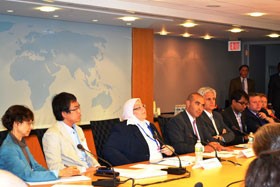
Photo: Civil Society Team
Having worked with civil society engagement work at the World Bank for many years, it is not uncommon for colleagues to see me in the hallway and jokingly ask: “is civil society still acting uncivil?”. The assumption being that when CSOs criticize the Bank they are not being constructive and thus not acting civil. While I understand the good-natured ribbing, I and most of my Bank colleagues actually believe the opposite is true. Most advocacy CSOs are being effective global citizens by monitoring the policies and programs of governments and inter-governmental organizations such as the World Bank. After all, governments and multilateral development Banks serve at the behest of citizens and thus they should welcome a watchful eye from CSOs, media, and citizen organizations to ensure that its taxpayer-generated international development funds are being well spent. In addition, as Bank President Jim Yong Kim recently said at the closing plenary of the 2013 InterAction Forum, important changes and reforms in history – such as the concerted response to the AIDS epidemic – are often driven by citizen activism spearheaded by CSOs. He further argued that what is now needed is a global citizens’ movement to advocate for effective climate change policies.
To be fair, the concept that a critical civil society is being uncivil is outdated and reminiscent of a time when most advocacy CSOs were outside on the streets protesting Bank policies. Today, CSOs are more often found inside the Bank participating in policy dialogue and consultation meetings. The recently held Spring Meetings exemplified well this important change in civil society’s role at the Bank. CSOs came in ever-larger numbers to the 2013 Spring Meetings. More than 700 representatives from 100 countries participated in the week long Civil Society Program from April 15 – 20, 2013. The Program included an orientation session on the World Bank and a CSO Roundtable with Executive Directors (see photo) which has become a standard feature of Annual and Spring Meetings. CSOs also participated in several high level sessions such as the Global Voices on Poverty event with Bank President Jim Yong Kim and UN Secretary General Ban Ki-moon.
More than the growth in numbers, however, the most significant aspect of civil society presence at the Spring Meetings was the informed and interactive nature of the dialogue during the 60 policy sessions held on a wide range of topics during the Civil Society Policy Forum. A cogent example of the significant nature of the policy dialogue was the session on the safeguards review (transcript, video). The four-hour session brought together some 60 CSO representatives from around the world with Bank Vice President, Kyle Peters, and the Bank’s safeguards review team to discuss the findings of the initial phase of the 2-year consultation process. The discussion centered on ways to streamline yet not weaken the application of the existing safeguards, and whether new principles such as human rights, gender equity, and disability inclusion should be incorporated into the revised policies.
Another notable session was on re-engagement in Myanmar organized by Burmese and US CSOs which brought together representatives from the World Bank, IMF, and Asian Development Bank to discuss the pace and scale of their re-engagement into that country. A third significant meeting was a briefing session with CSOs on the proposed new World Bank Group strategy with senior Bank managers leading the drafting effort. This will be the first time the Bank will have an overarching set of goals to guide its work and thus it is key to hear the views and perspectives of civil society on what is being considered.
The substantive nature of all three sessions clearly demonstrates how strategic and influential civil society participation at the Bank has become. From protesting outside the security perimeter a decade ago, CSOs are now a key component of the policy dialogue which occurs within the halls of the Bank, and their views are being clearly heard and taken into account. Thus the more appropriate question to ask is whether civil society is becoming “too civil” and may lose some of its advocacy edge as it engages more intensely with the Bank going forward. I don’t believe so, as there are many examples that show that civil society influence has increased as it has expanded its relations with the Bank but that is a discussion for another blog.
